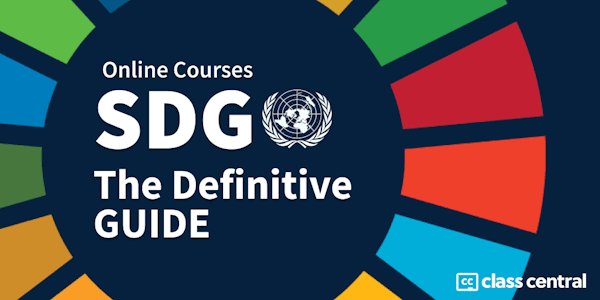Ecosystem Services: a Method for Sustainable Development
University of Geneva via Coursera
-
1.3k
-
- Write review
Overview
Ecosystem services are a way of thinking about – and evaluating – the goods and services provided by nature that contribute to the well-being of humans.
This MOOC will cover scientific (technical), economic, and socio-political dimensions of the concept through a mix of theory, case-studies, interviews with specialists and a serious-game. By the end of this course, our aim is to enable you to:
• define the concept of ecosystem services, its principles and limitations
• understand the key services associated with any ressource (e.g., fresh water) through readings and case-studies
• appreciate the advantages and potential risks of monetising ecosystem services
• appreciate the social dimensions (power issues, cultural biases) embedded within any method
• integrate tactical advice on mainstreaming this approach into policy and standard government practices
• Optional: learn how to map ecosystem services with GIS tools
The session that runs May 29th- July 10th will be actively monitored by the instructors, and learners will have the opportunity to ask questions.
This course was developed by instructors from the University of Geneva with the help of numerous researchers and input from the Geneva Water Hub and the Natural Capital Project. The course was financed by the University of Geneva, the Global Programme Water Initiatives of the Swiss Agency for Development and Cooperation (SDC), and the Luc Hoffmann Institute.
This MOOC is supported by the Geneva Water Hub and the University of Geneva along with the MOOC in « Water Resources Management and Policy » (www.coursera.org/learn/water-management) and the one in « International Water Law » (www.coursera.org/learn/droit-eau).
We look forward to you joining us!
Syllabus
- Frontiers in Ecosystem Services
- Play the TRADE-OFF game (online), meet the primary instructors of this course, and discover the key questions that we will be revisiting throughout this course in this introductory module.
- Valuation of Ecosystem Services
- Here you learn about what is valuation, the difference between a price and a value, and various ways to derive a monetary estimate for different ecosystem services. You will also learn about world views that differ radically from the anglo-saxon model with respect to concepts such as "nature" and "biodiversity".
- Understanding the Normative Dimensions of Ecosystem Services
- Valuing ecosystem services is a new way of thinking about nature and the environment. Such a change reflects contemporary norms and values, and speaks to contemporary trends in social, cultural, political and economic policies. In this module, you will learn about how the idea of ecosystem services was born, and get a grasp of the specific historical events, places and people who were behind it. You will also understand why it is useful to understand how this approach fits into global trends such as neoliberalism, learn to evalute how you position yourself within these normative and critical perspectives. You will reflect on whether it matters to think about the big picture, and become away of how such an approach can unexpectedly serve to perpetuate unethical or practices
- Quantitative and Spatially-Explicit Assessment of Ecosystem Services
- Now that you have learned what are Ecosystem Services, as well as their strengths and limitations to be used in the environment policy arena, you should be curious to know how we can in fact monitor, model and predict their values in space and time. In this module, we will explore how existing data (e.g. elevation, climate, land use, remote sensing) can be used to assess Ecosystem Services through mapping and models. We will then see that once we have a model we can predict the outcomes of different scenarios on the value of Ecosystem Services. Scenarios are themselves particularly useful when interacting with various stakeholders, policy and decision makers. In order to illustrate this process, we present four case studies at various spatial scales: global, European, national and local.
- Mainstreaming Ecosystem Services into Decision-Making Process
- The ecosystem service approach is based on the premise (and promise?) that more sustainable use of natural ressources can be identified through a scientific and social process (Modules 1-4). But how does one get governments (international, national, local) to adopt such practices and then to implement the policy recommendations? This is the challenge of "mainstreaming" a new idea. In this module, you will learn about the challenges and some tips for mainstreaming ecosystem services.
- Create your own Ecosystem Services Case (optional)
- With this last optional module, we would like to give you the opportunity to move from theory to practice by encouraging you to assess a water related ecosystem services (water yield). The aim is to help you discover where you can find useful data to assess ES; how you have to prepare this geospatial data in Geographic information System (here QGIS); how you can use this data to run a simple hydrological model to assess water yield with a dedicated tool with the InVEST package; how you can explore plausible futures of this water resource through scenarios; and finally how you can interpret the outputs of your model as maps in QGIS. Data for a case study is provided with the Tana River basin in Kenya, but you are encouraged to reproduce similar results with your own case study from anywhere in the World. If it will be easier to complete this exercise if you already are somewhat familiar with GIS.
Taught by
Martin Schlaepfer, Juliet Jane Fall and Anthony Lehmann
Tags
Reviews
5.0 rating, based on 1 Class Central review
4.8 rating at Coursera based on 688 ratings
Showing Class Central Sort
-
The course are well-organised and discuss ecosystem service at different aspect, including valuation, data collection and mapping, critique and mainstreaming at a very detail way. It give a whole picture on what ecosystem service is and how it can affect policy making to achieve a sustainable development.




